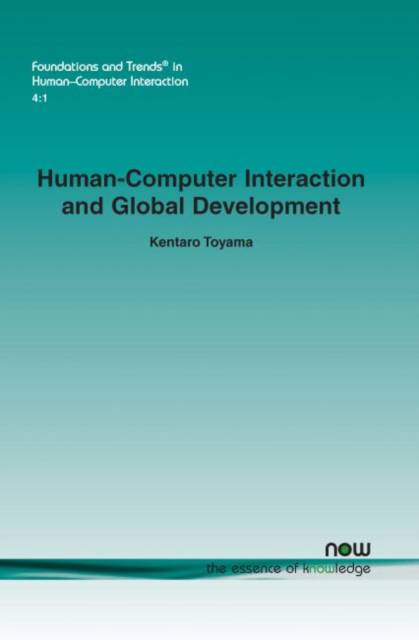
- Afhalen na 1 uur in een winkel met voorraad
- Gratis thuislevering in België vanaf € 30
- Ruim aanbod met 7 miljoen producten
- Afhalen na 1 uur in een winkel met voorraad
- Gratis thuislevering in België vanaf € 30
- Ruim aanbod met 7 miljoen producten
Zoeken
Omschrijving
International development is concerned with making life better for the least privileged people of the world. Since the 1990s, HCI has engaged increasingly with development through an interdisciplinary field known as "information and communication technologies for development," or ICT4D. This article overviews the historical relationship between HCI and international development, compares their disciplinary approaches, and suggests that both sides would gain from ongoing interaction. International development could benefit from HCI's broad methodological tools, which include qualitative and quantitative research methods, design through iterative prototyping, and reflective inquiry. HCI could benefit from international development's exposure to a broader base of cultures, sectors, and concerns. These issues are discussed with specific examples from published papers and several well-known projects that apply HCI to development. Finally, future directions for an ongoing collaboration between HCI and development are also indicated.
Specificaties
Betrokkenen
- Auteur(s):
- Uitgeverij:
Inhoud
- Aantal bladzijden:
- 94
- Taal:
- Engels
- Reeks:
- Reeksnummer:
- nr. 12
Eigenschappen
- Productcode (EAN):
- 9781601983909
- Verschijningsdatum:
- 15/11/2010
- Uitvoering:
- Paperback
- Formaat:
- Trade paperback (VS)
- Afmetingen:
- 156 mm x 234 mm
- Gewicht:
- 145 g

Alleen bij Standaard Boekhandel
+ 159 punten op je klantenkaart van Standaard Boekhandel
Beoordelingen
We publiceren alleen reviews die voldoen aan de voorwaarden voor reviews. Bekijk onze voorwaarden voor reviews.











